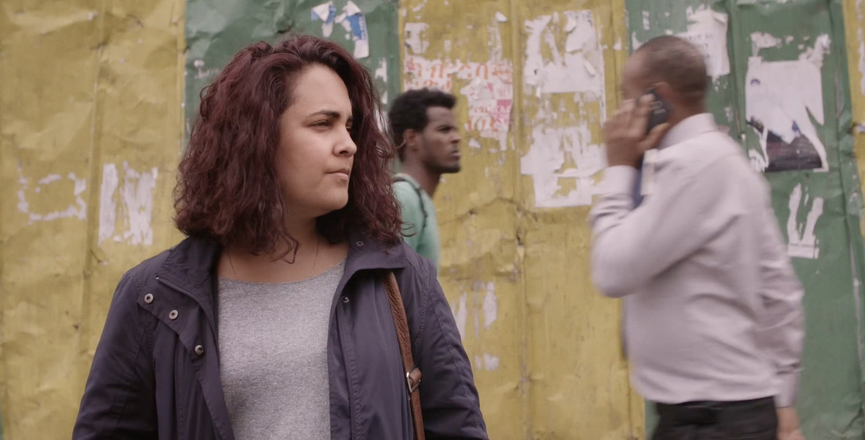The titular person in Finding Sally, a documentary film directed by Tamara Mariam Dawit, is actually named “Selamawit,” which means “peace” in Amharic. The concept/name becomes the tuning fork of the documentary, because peace is something Ethiopians could not have. It is something Dawit’s family were seeking, and the life of Selamawit would be the opposite: scored with violence.
The documentary launched at Hot Docs (which went online) back in April. More screenings will be announced in the fall.
Dawit ventures back to Addis Ababa, Ethiopia’s capital, to begin a new life among her four aunties and to reconnect with a part of her personal history. She was raised by a Canadian mother. Her father, who passed away a decade ago, was estranged from her, having remarried when she was child.
Dawit didn’t discover her fifth auntie until she was 30. She noticed a large photo of a gorgeous young woman with a luminous face and smile staring down at her from her grandmother’s fireplace. Sally/Selamawit. But mention of her seemed to be forbidden. Sally remained an enigma, separate from Dawit’s immediate life.
Now in her late 30s, Dawit seeks to unpack the mystery and the pain. It would be a fascinating journey into the heart of Ethiopia’s violent upheavals and to the soul of her family’s pain.
The film’s first section of exposition introduces us to her four engaging aunties. Sharp, intelligent and vivacious, they are painters, teachers and a banker/talk show host. Their family had been part of an elite — their father a diplomat who was briefly stationed in Ottawa. He decided to leave the sisters and their one brother, Dawit’s father, in Canada to finish their studies. Thus, the siblings became permanent expats i.e. comfortable wherever they landed but always “foreign” in their homeland.
Sally was popular, fashionable, clever and “extremely fun-loving,” as one sibling describes.
“She fell madly in love with everyone she dated” and “dreamed of having a house full of children” recall the others to Dawit.
Dawit carefully pieces together the jigsaw puzzle that interlocks the family and Ethiopia’s bloodied past. Pictures and archival footage propel the narrative, underscored by evocative music from Zaki Ibrahim and edited expertly by Mahi Rahgozar. We get a lively gallop through the sisters’ spirited lives as young students in Ottawa, and then a return to Ethiopia in the summer of 1973.
What I learn was that Ethiopia was ruled by an emperor and, for decades, there existed a major divide between the hard-scrabble lives of workers and an upper class of bureaucrats.
Nevertheless, Addis Ababa at the time was hopping. The sisters recount a pleasurable time of parties, music and intense friendships. Life was easy … and then, it was not. A year later, Ethiopia would fall into dangerous, murderous times which would last for more than four decades.
While her sisters left Ethiopia to pursue their own lives, Sally decided to stay. In the summer of 1974, a massive movement was fomenting to unseat the emperor, Haile Selassie. Sally had been a teacher at the time and was now involved with members of the Ethiopian People’s Revolutionary Party (EPRP), which has Communist roots.
“She surrounded herself with a nice group of people … she became more political,” noted one auntie.
Going underground
Low-ranking military officers joined the movement and soon, after the summer, they took over and Selassie was no more. These officers were, unfortunately, even more ruthless for power. Called the Derg, they started to suppress and kill opposition — people were shot on sight. Sally, with her leanings, went underground. The family was told not to contact her.
Sally ended up marrying one of the EPRP’s commanders, Tselote, in a quiet ceremony attended only by their family members. Both of them were on a government most wanted list. One of Sally’s old comrades, a key to the past, says they knew they had to leave the city. Thus, ending up deep in the countryside in a place where there is no clean water or medical facilities surrounded by a dry, desolate landscape. It is here that Sally would remain, for the most part.
In the middle parts of the film, we witness the brutalities of the new regime (look up “red terror” and Mengistu Haile Mariam, you won’t forget what you find out). Dawit gently urges her aunties to delve into that time as well as her grandmother, Sally’s mother, and Tselote’s mother. Watching this, I cannot fathom the daily horrors they have lived under and I am in wonder that they survived. Throughout, as the characters relive history, I felt the tension of not knowing: What happened to Sally? What was she up to all this time? How did she die?
It’s surprising as Dawit reveals the year the family found out Sally had died (a while ago — no spoilers). The film continues along its mystery trail and as a viewer, one mulls over: Why haven’t they bothered to look into it?
“I want to think of her as she used to be,” states one auntie.
Dawit forges on and the last part of the documentary is a pilgrimage to the harsh landscape of Sally’s final moments. The truth is uncovered bit by bit at the end. It is quite a reveal. Fear obstructs and makes you inert but, if you don’t reclaim the past, you can’t imagine a future. At the village, they find a bit of selamawit.
Find a list of future viewings here.
June Chua is a Berlin-based journalist who regularly writes about the arts for rabble.ca.
Image: Screenshot from Finding Sally.




